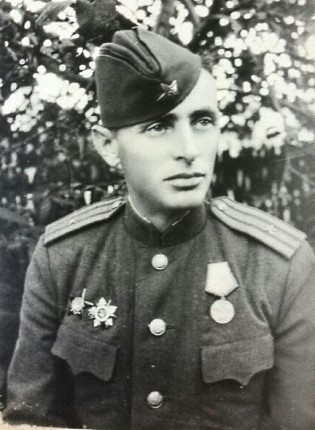Shloyme Rabinovich was born in the shtetl of Ushomir, near Korosten, in northern Ukraine, in 1903. In the early 1920s, he moved to Moscow and entered Moscow State University in the faculty of journalism. In the 1930s, he was deputy editor-in-chief of the central Soviet Yiddish newspaper "Der Emes". After the arrest of the paper's editor-in-chief Moyshe Litvakov in October 1937 and until January 1939, when "Der Emes" was closed by the Soviet authorities, the paper was edited by an anonymous "editorial board." There are grounds for believing that, in fact, its editor was Shloyme Rabinovich.
With the beginning of the Soviet-German war, Shloyme Rabinovich was immediately mobilized to the Red Army. As a journalist, he became an editor of the frontline newspaper of the 352nd Infantry Division titled "Forward to the West." Later he became its editor-in-chief. In November 1943, Major Rabinovich was awarded the Order of the Red Star, and in August 1944 – the Order of the Patriotic War. Upon receiving this award, Rabinovich delivered a short speech in which he expressed his pride at the participation of many Jewish warriors in the battle against the Nazis. His third order, once more the Order of the Patriotic War, was awarded in May 1945, already after the end of the war.
After the end of the war and his demobilization, Rabinovich became a deputy editor-in-chief of the Yiddish newspaper "Eynikayt" – until its closing by the authorities in 1948. Around this time, he published a book in which he discussed the Jewish contribution to the Soviet victory, noting the percentage of Jews among those awarded military orders and medals and that of the Jews – who were honored as Heroes of the Soviet Union. In 1949 he was arrested and then spent six year in a GULAG camp in Siberia. After Stalin's death, in 1956 Rabinovich returned to Moscow, where he worked as a journalist.
Shloyme Rabinovich died in 1971.
From a letter of Shlomo (Semion) Rabinovich to his wife Roza Kats and his children, with his reaction to the mass murder of Jews [August 1944]
I would like to inform you that I have received a new award – the Order of the Patriotic War. It was a general who gave me this award. I could not restrain myself and made a brief speech. I said that my people was happy that its sons, shoulder to shoulder with the Russian people, are defending their homeland, and that we Jewish soldiers would fulfill the expectations the [Soviet] people have of us. Well, those who were present were moved a little because I said a few kind words from my heart, from my whole heart. I almost cried myself because I was so worked up. How is it possible not to fight against such a vile enemy? He killed my father, my mother, my family, he beat and tortured my people, drowning millions of people in blood. In response, in his congratulatory remarks, the general referred to my speech: "We have seen," he said, "rivers of blood of the Jewish people for hundreds of kilometers from Smolensk to the German border."
"I give my word of honor as a general," [he said,] "that when we reach Germany, we will take brutal revenge for the torment and the sorrow of the people.
Yes, that so will be, and I live now with the thought that I will take revenge with my own hands. This is the dream with which I live.
Your husband and father, S. Rabinovich.
From: To Pour Out My Bitter Soul: letters of Jews from the USSR, 1941-1945 (Jerusalem: Yad Vashem, 2016), pp. 101-102.

